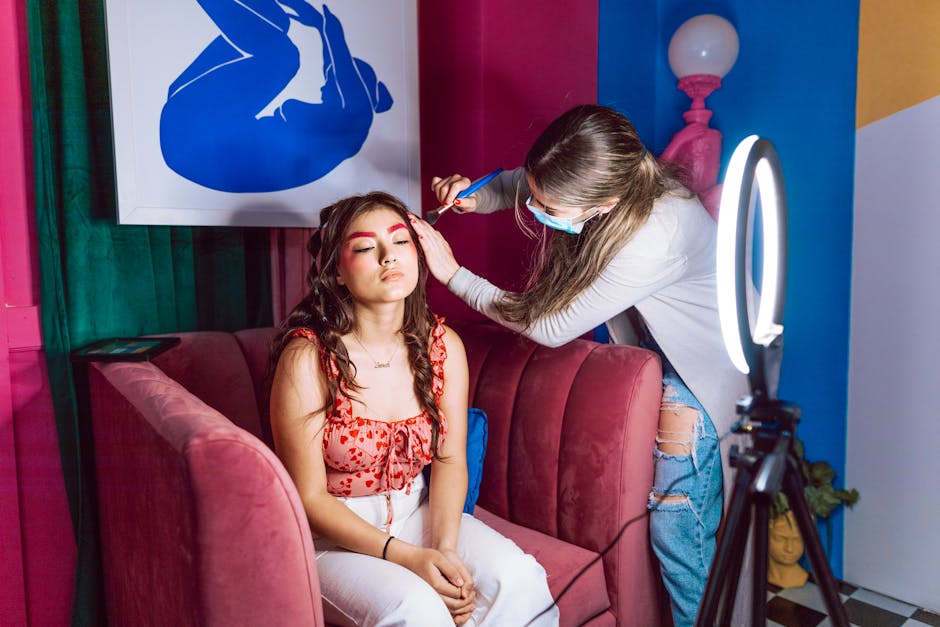The relentless march of technology has irrevocably altered numerous industries, and the beauty sector is no exception. From groundbreaking innovations in product development to revolutionary approaches to client engagement, technology is sculpting a new paradigm in fashion and beauty. This transformation is multifaceted, impacting everything from the creation of cosmetics to the way consumers interact with brands.
One pivotal influence lies in the realm of product innovation. Sophisticated analytical tools allow scientists to meticulously study skin composition and the interactions of cosmetic ingredients on a molecular level. This deeper understanding enables the development of highly targeted formulas, tailored to specific skin types and concerns. Consequently, products like serums with enhanced efficacy and personalized skincare routines are becoming increasingly common. Furthermore, 3D printing technology is emerging as a game-changer. This allows for the creation of customized prosthetics and cosmetic enhancements with unprecedented precision, opening up possibilities for bespoke beauty solutions.
Beyond product development, technology is profoundly changing how beauty brands interact with consumers. Digital platforms like social media have become indispensable marketing tools. Beauty influencers, often with millions of followers, drive consumer interest and promote particular brands and products, thereby shaping trends and expectations. This influence extends beyond the realm of social media. Online consultations with beauty experts facilitate personalised advice and recommendations, offering a tailored approach that wasn’t previously possible. E-commerce platforms have democratized access to beauty products, allowing customers to explore diverse brands and purchase products from anywhere in the world, expanding the scope of the market significantly.
Another crucial area of impact is the emergence of virtual reality (VR) and augmented reality (AR) technologies. VR experiences offer immersive try-on options for makeup, allowing consumers to envision how different shades and looks will appear on their face, reducing the risk of purchasing the wrong product. AR filters and applications provide a similar interactive experience, enabling experimentation with different hairstyles, colour palettes, and even cosmetic enhancements before committing to a purchase. This engagement aspect is particularly appealing to a younger generation, enhancing brand appeal and fostering customer loyalty.
The data generated through these digital interactions is also incredibly valuable. Beauty brands can leverage this information to understand consumer preferences and tailor their products and marketing strategies to resonate with their target demographics. For instance, customer feedback collected through online surveys and app interactions can help identify unmet needs and create products that meet specific desires. This consumer-centric approach is transforming the relationship between beauty brands and their clientele, enabling a more individualized and satisfying experience.
However, this technological revolution isn’t without its challenges. Ethical considerations surrounding data privacy are paramount. Beauty brands must transparently handle user data and safeguard consumer information. Ensuring that AI-powered tools are used responsibly and ethically is also crucial, to avoid perpetuating biases or reinforcing harmful stereotypes. Moreover, the digital sphere can amplify unrealistic beauty ideals, potentially leading to body image concerns and pressure for unattainable standards. Brands have a critical role to play in fostering a positive and inclusive representation of beauty across all demographics.
Furthermore, the integration of technology into the beauty industry raises questions about inclusivity and accessibility. Some technologies might not be equally accessible to all consumers, potentially exacerbating existing inequalities. Brands need to be mindful of ensuring equitable access and develop strategies that cater to diverse needs and limitations.
Looking to the future, the convergence of technology with biotechnology presents exciting possibilities. Personalized medicine approaches will likely play a bigger role in anti-ageing solutions, and advanced algorithms will enable customized treatments for various skin conditions. The trend of integrating technological tools into the practice of aesthetic procedures is steadily rising. These techniques can provide more precise interventions, reducing recovery times and minimizing discomfort for clients.
In conclusion, technology is profoundly reshaping the fashion and beauty industry. From customized products to immersive virtual experiences, technology offers innovative solutions for enhancing both product development and customer interactions. While ethical considerations are vital, and inclusivity must be a priority, the transformative influence of technology promises to revolutionize the beauty industry further in the coming years. This evolution is not just about creating new products; it’s about redefining how we perceive, interact with, and experience beauty itself. The opportunities for innovation are vast, and the future of beauty is undeniably digital.






